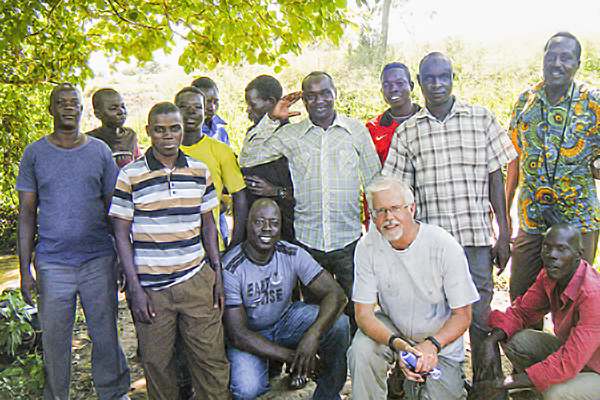The new collaborating center focuses on diagnostics needed to verify progress toward global elimination of the disabling parasitic infection onchocerciasis
TAMPA, Fla. (June 28, 2018) – The Pan American Health Organization/World Health Organization (PAHO/WHO) has designated the University of South Florida College of Public Health’s Department of Global Health as the world’s only Collaborating Centre for Onchocerciasis Diagnostics.
Thomas Unnasch, PhD, chair of global health and distinguished USF Health professor, will serve as the director of the new center, which will focus on the disabling parasitic infection onchocerciasis, commonly known as river blindness – the second leading cause of infectious blindness worldwide. WHO designations are given to laboratories or institutions with a history of collaboration with WHO and active research programs supported by external funding from other sources.

USF Health’s Thomas Unnasch, PhD (first row, second from right), one of the world’s leading experts on onchocerciasis, with a local team in Uganda employed to help with collection and control of the black flies that spread the sight-robbing parasitic infection. The photo was taken May 2016 along the Aswa River outside a village where the field work was done. |Photo courtesy of Dr. Unnasch
“This center is unique in the world,” Unnasch said. “There are currently 88 active WHO collaborating centers in the United States. The largest number of these — about 20 percent — are at the Centers for Disease Control and Prevention in Atlanta. These cover all aspects of health, from emerging infectious diseases to social determinants of health.”
Unnasch is one of the world’s leading experts on onchocerciasis, which is spread by the bite of a black fly that breeds in fast-flowing rivers. His more than 20 years of research on the parasitic affliction has taken him to Central America, South America and Africa and been supported by the National Institutes of Health, the National Science Foundation, the Bill and Melinda Gates Foundation and the Task Force for Global Health, as well as WHO.
“This designation is a great honor,” he said. “It will allow us to expand the logistical and technical support activities that we conduct for the laboratories established by The Carter Center in Africa and Latin America to include additional countries and laboratories. All activities are aimed at providing diagnostic support to verify onchocerciasis elimination.”
According to the CDC, river blindness is categorized as a neglected tropical disease — one that causes substantial illness for more than one billion people globally, especially among those living in poverty.
The disease spread by black flies in the genus Similium, and those infected may experience skin rashes, severe itching, large nodules under the skin caused by adult worms living below the skin and, eventually, blindness.

Thomas Unnasch, PhD, directs the new WHO-designated Collaborating Centre for Onchocerciasis Diagnostics.
Infected adults may take the antiparasitic medication ivermectrin to destroy the larvae living in the body; however, there is no approved treatment for children under age 5.
“It is always an honor to be recognized by the World Health Organization as a center of excellence,” said Donna Petersen, dean of the USF College of Public Health. “We are already home to the WHO Collaborating Center for Social Marketing. Adding this one dedicated to the eradication of a global scourge is a clear testament to the excellent work conducted by our faculty and to the particularly stellar reputation earned over many years of devoted effort by Dr. Unnasch.”
-Story by Anna Mayor, USF College of Public Health
